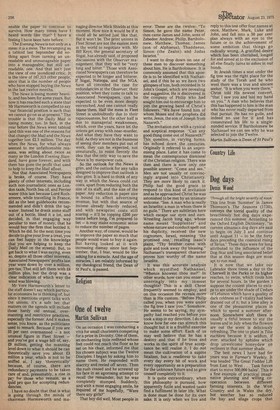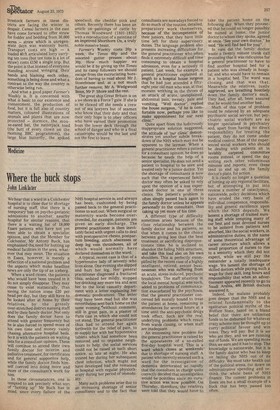Country Life
Dog days
Denis Wood
'Through ali the bright severity of noon' This line from 'Summer' in James Thomson's The Seasons (1730), conveys the torrid quality of the breathlessly hot dog days experienced this summer. According to the Oxford English Dictionary, "in current almanacs dog days are said to begin on July 3 and continue until August 11 — to be the forty days preceding the cosmical rising of Sirius." These days were for long attributed to the influence of the Dog-Star and long associated belief that at this season dogs are most apt to run mad.
It is now that we take our Labrador three times a day to the Cherwell in the Parks or its higher reaches, to swim, which cools him for several hours. In the garden I suppose the coolest places to escape to are under the shade of Cedars of Lebanon which have a quality of dark coldness as if vitality had been drained out of it; but a lime alley is one of the pleasantest places in which to spend a summer afternoon. Somewhere aloft there is usually a fitful breeze to stir the leaves and in July when the flowers are out the scent is deliciously refreshing. The one to plant is Tilia euchiora because it is seldom, if ever, attacked by aphides which drop unwelcome honeydew on recliners in that summer shade.
The best news I have had for years was in Farmer's Weekly. It was headed 'The Great Fodder Lift from East to West. . ,Task forces start to move 500,000 bales'. This is a fine example of practical imaginative planning and willing cooperation between different farming interests. In the West Country and in Wales the dry, hot weather has so reduced the hay and silage crops that
livestock farmers in these districts are facing the winter in despair. Cereal farmers in the east have come forward to offer straw for fodder and bedding from 30,000 acres — straw which is unregenerate days was wantonly burnt. Transport costs are high — a loaded 40 ft articulated lorry carrying ten tons (but ten tons is a lot of straw) costs £150 a single trip. But the point is that instead of everyone standing around wringing their hands and blaming each other, something is being done and what a contrast to the way the country is otherwise being run.
And what a good paper Farmer's Weekly is. It is concerned with what is basic to our existence and contentment, the production of food, but it is full also of country matters, coloured illustrations of animals and plants that are now protected — dormice, the mouse-eared bat, the natterjack toad (the butt of every clown on the morning BBC programmes), the large blue butterfly, the spiked
speedwell, the cheddar pink and others. Recently there has been an article on paintings of cattle by Thomas Woodward (1801-1852) with a reproduction of a painting of an improved Shorthorn Ox, a truly noble massive beast.
Farmer's Weekly costs 20p a week, the Times 60p and the assorted gutter presses about 30p. How much happier we would be if by giving up the Times and its camp followers we should escape from the excruciating boredom of having to read about Mr J. Stonehouse and, at a not much further remove, Mr A. Wedgwood Benn, Mr P. Shore and the rest.
The great ship Great Britain is on a lee shore in a Force 7 gale. If she is to be clawed off she needs a crew not of sea lawyers but of seamen who know that their duty and that their only hope is to obey officers who have earned their promotion from the lower deck through the school of danger and who in a final catastrophe would be the last and not the first to leave.



































 Previous page
Previous page